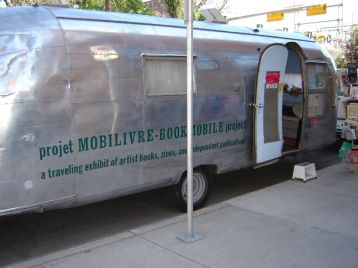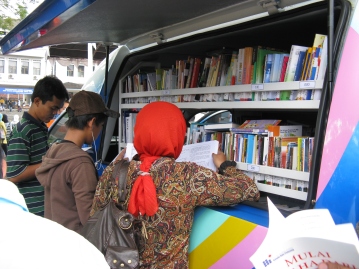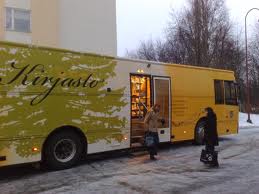When it’s a travelling circus, tardis-like time machine, miniature world fair, fold-away workshop or peripatetic emporium of technology. (For more options, see this blog post by tinyme: http://www.tinyme.com/blog/10-must-see-mobile-libraries/).
Or alternatively, when the service has been cancelled because it’s not cost-effective.
The traditional image (reality?) of the mobile library in England is a slightly tatty bus with a limited stock selection and possibly a single computer with wifi connection. It’s often a bit of a millstone around the local authority’s neck – an expensive service that is hard to maintain and used by relatively few people… but if withdrawn it leaves some rural areas feeling they are without a physical library service at all.
You may call me Pollyanna, but I don’t see it that way. To me the mobile library has incredible potential to be an engaging, exciting and unique cultural experience for the public it serves.
(Image: Book Mobile, Jonathan Dueck)
I see a buzz of excitement as the brightly coloured, eccentrically shaped customised vehicles roll into small towns, villages and deprived suburbs. I see vivid mobile sculptures unfolding from roofs and pop-up tents bursting out of doors. I see storytellers and performers setting up intimate shows and workshops for rural communities.
(Image: , Colourful Mobile Library, Ikhlasul Amal)
I see community book sharing and imaginatively curated book collections – in the evening I see book clubs and writing clubs taking over the space and writing recommendation cards for other readers to find in the books they have read (or written). I see outdoor cinemas and intimate film screenings of BFI collections by virtual film clubs networked across the local authority, just like the Finnish mobile library showcased in this year’s IFLA conference:
“Välkky is a unique Mobile Library in Espoo, Finland. In addition to the traditional lending stock the bus has a wide range of interactive media. In the mornings the Mobile library visits schools and kindergartens as a modern children´s library. In the afternoons and evenings Välkky can function as a Writer´s bus, a movie theatre, a multimedia workshop, a meeting place for a book club or a handicraft group for adult clients” (IFLA Conference 2014: http://www.ifla.org/files/assets/public-libraries/publications/day_1_10.45_-_eva_wilenius1.pdf)
(Kajaani Mobile library, Wikimedia Commons)
I see mobile makerlabs and interactive play emporiums/libraries/activities sponsored by local children’s services, just like this Pop Up Parks one being piloted in a Design Council and Guy’s and St Thomas Charity project in Southwark right now: http://thekneehighproject.com/2014/08/26/team-update-pop-up-parks-5/

(image courtesy of Pop Up Parks)
I see travelling interactive art and museum exhibitions, like those curated by Isis Arts in their bespoke mobile arts space: http://www.isisarts.org.uk/the-big-m
And of course, me being me, I see robotics kits and learning tools for all ages to find out how to make as well as use technology.
I also daydream and wonder about partnering with local retailers to transport affordable fruit and vegetables to communities that don’t have access to them on their doorstep, delivering health information services for local PCTs, partnering with blood banks and adult education services, homes for the elderly and services for disabled people to provide economies of scale and a service that people will queue round the block to experience.
The business model for a mobile library is tricky, but it can’t be impossible, especially if it provides the rustle and hum of excitement of the travelling circus when it comes to town.
(Cover photo: The small enchanted circus at night… Cosmonautirussi)



